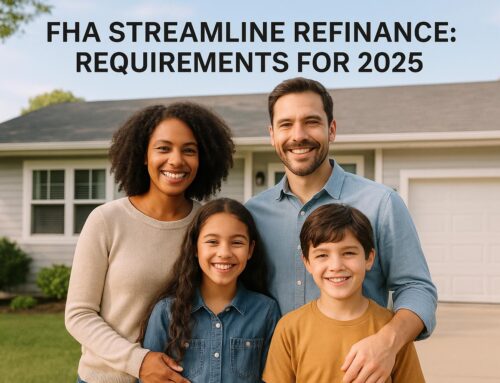When applying for an FHA loan, rental income can help you qualify for a larger loan or improve your approval chances. But FHA has strict rules for proving rental income. Here’s what you need to know:
-
Who Needs Rental Income Proof?
- Buyers of multi-unit properties renting additional units
- Refinancers with rental units
- Borrowers using rental income from other properties
-
Documents You’ll Need:
- Tax Returns: Two years, including Schedule E
- Bank Statements: 12 months of rental deposits
- Lease Agreements: For current or new rentals
- Other Proof: Rent checks, electronic payments, or appraisals
-
How Lenders Calculate Rental Income:
- Use a 12-month average or recent 3-month average
- Deduct vacancy allowance (25%) and expenses (taxes, insurance, maintenance)
- Only 75% of gross rent counts for multi-unit properties
Example Calculation:
For a $2,000/month rental:
- Gross Rent: $24,000/year
- Vacancy Allowance (25%): -$6,000
- Expenses (taxes, insurance, maintenance): -$6,000
- Net Qualifying Income: $12,000/year ($1,000/month)
Key FHA Guidelines:
- Rental income must cover PITI (Principal, Interest, Taxes, Insurance).
- Proper documentation is required for stable and verifiable income.
Quick Tip: Use digital tools like HomeLoanAgents to manage documents and speed up the process.
FHA rental income rules can be complex, but with the right preparation and documents, you can use rental income to strengthen your loan application.
FHA Loan with Rental Income – Rental Income Guidelines
FHA Rental Income Rules
The Federal Housing Administration (FHA) allows borrowers to count rental income as part of their qualifying income when applying for a mortgage. Lenders evaluate this income based on how stable and consistent it is over time. Here’s a closer look at the FHA rental income rules and who qualifies.
Who Can Use Rental Income
Borrowers, including real estate investors, may use rental income to qualify for FHA loans. HomeLoanAgents provides services to help document and optimize this income effectively [1].
Required Rental Income Documents
To get FHA approval, you’ll need to provide documented proof of rental income. According to the 2025 FHA guidelines, lenders require evidence of both current and projected rental income.
Proof of Past Rental Income
For existing rental properties, you’ll need:
- Tax Returns: Provide two years of federal tax returns, including Schedule E, to confirm your rental income and expenses [4].
- Bank Statements: Submit 12 months of bank statements showing consistent rental deposit activity [2].
- Payment Records: Include copies of rent checks or electronic payment confirmations [3].
If the property has been owned for less than a year, you’ll need:
Extra Verification Documents
The required documents may vary depending on the type of property:
| Property Type | Required Forms | Additional Documents |
|---|---|---|
| Single-Family | Form 1004/URAR and Form 1007 | Lease agreement |
| Property with ADU | Form 1004 with operating statement | Utility bills and occupancy certificate |
| 2-4 Units | Form 1025 and Form 72 | Individual unit leases |
For non-traditional rental setups, such as boarders, you’ll need:
- Notarized rental agreements
- Proof of separate living quarters
- Bank records showing 12 months of deposits [3]
In special situations, additional documents are required:
- Inherited Properties: Submit probate documents, updated title insurance, and either 12 months of rental history or a professional appraisal [2][4].
- Self-Employed Landlords: Provide business tax returns, profit and loss statements specific to rental operations, and six months of business bank statements [4][6].
If there are rental income gaps longer than three months, include:
- A written explanation for the vacancy
- Either six months of PITI reserves or a 25% reduction in calculated rental income [5]
HomeLoanAgents simplifies the process with a secure digital portal that automates tasks like bank statement analysis and IRS transcript retrieval [6].
The next section will explain how these documents are used in rental income calculations.
sbb-itb-8115fc4
How Lenders Calculate Rental Income
FHA lenders follow specific formulas to calculate rental income when determining loan eligibility. This process involves analyzing documented income and applying standard deductions.
12-Month Income Average
For 2025, lenders calculate rental income using a 12-month average. At least 9 months of rental payments are required for this calculation. The formula for net rental income is:
Net Rental Income = Gross Rental Income – (Vacancy Allowance + Operating Expenses)
Here’s what is typically deducted:
- 25% for vacancy allowance
- Property taxes and insurance
- HOA fees (if applicable)
- 10% reserve for maintenance
Example: A property rents for $2,000/month ($24,000 annually):
- Gross Annual Rent: $24,000
- Vacancy Allowance (25%): –$6,000
- Property Taxes/Insurance: –$3,600
- Maintenance Reserve (10%): –$2,400
- Net Qualifying Income: $12,000 ($1,000/month)
If only 10 months of rent were collected, totaling $18,000 annually, the monthly income would be recalculated:
($1,500 × 10) / 12 ≈ $1,250/month.
Managing Income Changes
Lenders prioritize income stability by using the lower income average. Here’s how it works:
| Calculation Method | Scenario | Result |
|---|---|---|
| 12-month average | $2,000/month for 9 months, $1,500/month for 3 months | $1,875/month |
| Recent 3-month average | Last 3 months at $1,500/month | $1,500/month |
For multi-unit properties, the unit occupied by the owner is excluded. Rental units are qualified at 75% of gross rent, provided there’s at least a 6-month rental history.
For newly acquired properties:
- Use actual rent receipts if there’s more than 6 months of rental history.
- Apply 75% of the appraised market rent when rental history is less than 6 months.
- Refer to the previous owner’s Schedule E if available [7].
Accessory Dwelling Units (ADUs) follow simplified guidelines:
- Require 12 months of rental history.
- Accept bank statements as proof of income.
- Limit ADU income to 30% of the borrower’s total qualifying income [8].
Rental income must fully cover PITI (Principal, Interest, Taxes, and Insurance) and at least 85% of total housing costs. To calculate true cash flow, lenders add back deductions from Schedule E, such as depreciation, mortgage interest, property taxes, and insurance [9].
HomeLoanAgents Services
HomeLoanAgents simplifies the FHA loan process with advanced digital tools and personalized support. Their services make FHA rental income verification easier by combining AI-powered underwriting with expert assistance, all while adhering to FHA guidelines.
For rental property investors, HomeLoanAgents provides tailored support, including:
Digital Document Management
- Secure uploads for rental agreements and tax returns
- Automated verification of bank deposits
- Real-time tracking for documents
- Digital archiving for easy access
Specialized FHA Processing
Their team assists with verifying rental payment histories, ensuring compliance with FHA documentation requirements. These services integrate seamlessly with their digital tools for a smooth experience.
| Service Feature | Benefit to Borrowers |
|---|---|
| AI-Driven Underwriting | Faster preliminary approval decisions |
| Digital Income Verification | Less paperwork and quicker processing |
| Real-Time Progress Updates | Full transparency throughout the process |
| Dedicated Loan Advisors | Personalized help with documentation needs |
"We combine technology and personalized service to deliver secure, innovative mortgage solutions tailored to every borrower." – HomeLoanAgents [1]
The platform blends AI tools with professional guidance, simplifying the rental income qualification process. Whether you prefer tech-driven solutions or traditional loan officer support, they offer the flexibility to match your needs.
Faster Approval Process
Take advantage of instant pre-qualification, digital asset and income verification, automated rental history analysis, and eClosing to speed up approvals.
With over 30 years of expertise, HomeLoanAgents understands the challenges of FHA rental income requirements. They provide clear, reliable guidance on documentation and ensure full transparency about how each document impacts your loan qualification.
Summary
Here’s a quick overview of the essential points regarding FHA rental income documentation based on the rules and requirements discussed earlier.
Key Documents:
- Tax returns and rental agreements are the main forms of proof.
- Bank statements and rental records showing consistent deposits.
- Property management statements, if applicable.
Key FHA Guidelines:
- Rental income must be properly documented and verifiable.
- Properties should have a consistent rental history.
- Income calculations follow FHA-specific formulas.
- Documentation must comply with 2025 standards.
HomeLoanAgents simplifies FHA rental income verification with their digital platform. Using AI underwriting and expert advisors, they ensure your documentation aligns with FHA requirements.
"We combine technology and personalized service to deliver secure, innovative mortgage solutions tailored to every borrower." – HomeLoanAgents [1]
Best Practices for a Strong FHA Loan Application:
| Best Practice | Impact on Application |
|---|---|
| Digital Submission | Speeds up verification |
| Real-Time Income Tracking | Enhances calculation accuracy |
| Professional Review | Ensures FHA compliance |
| Automated Updates | Keeps you informed |
Accurate rental income documentation plays a crucial role in loan approval. HomeLoanAgents’ tech-driven approach not only simplifies the process but also ensures compliance with FHA guidelines. Their platform provides clear updates, helping you understand how rental income factors into your loan approval.
FAQs
What are some common mistakes borrowers make when submitting rental income documentation for an FHA loan?
Borrowers often make a few key mistakes when providing rental income documentation for an FHA loan. One common error is failing to include a complete two-year history of rental income, which is typically required to show consistency and reliability. Missing or incomplete tax returns, such as not providing Schedule E from IRS Form 1040, is another frequent issue since this form is crucial for verifying rental income.
Additionally, some borrowers overlook the importance of providing signed lease agreements for current tenants, which help confirm the property is actively generating income. Ensuring all documentation is accurate, up-to-date, and aligned with FHA guidelines can help avoid delays in the loan approval process.
How does rental income impact FHA loan approval and the amount I can qualify for?
Rental income can play a significant role in your FHA loan approval process and the loan amount you may qualify for. When properly documented, rental income can be included as part of your gross income, which may increase your borrowing power. However, FHA guidelines require that this income is stable, consistent, and well-documented, typically through signed leases, tax returns, or other official records.
Keep in mind that lenders will also factor in any expenses associated with the rental property, such as maintenance costs or mortgage payments, when calculating your debt-to-income (DTI) ratio. A lower DTI ratio can improve your chances of approval and potentially allow you to qualify for a higher loan amount. For personalized advice and tailored mortgage solutions, consider reaching out to HomeLoanAgents, where experts can guide you through the process with ease.
What are the best ways to simplify gathering and submitting rental income documentation for an FHA loan?
Gathering and submitting rental income documentation for an FHA loan can be streamlined with proper preparation and organization. Start by ensuring you have all the required documents, such as lease agreements, tax returns, and proof of rental payments, ready to submit. Many lenders also accept digital copies, which can save time and reduce paperwork.
If you’re looking for a smoother process, consider working with a lender like HomeLoanAgents. Their expert team and advanced technology can help guide you through the documentation requirements, ensuring you meet FHA guidelines quickly and efficiently. Staying organized and leveraging professional support can make the process stress-free and straightforward.
Related posts








